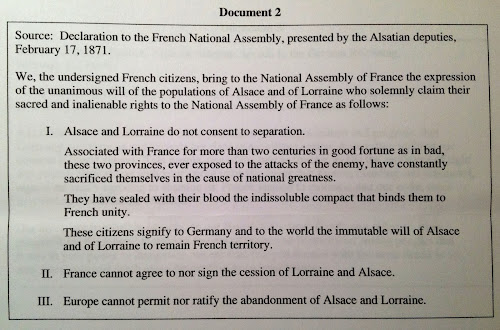So far, we have examined analyzing point-of-view (PoV) by relating the author's point of view to his or her place in society and by evaluating the reliability of a source. This time we will explore a couple of other methods of examining PoV in a DBQ.
As you read and examine each document it is important to keep in mind that different types of documents serve different purposes. The purpose of a document may have a profound effect on the opinion (PoV) offered by the author. If the source happens to be a public lecture or speech, take note of the audience for the occasion. A speech to a democratic parliament and one given to a croud of protesters may have different purposes; one may be intended to arouse support for a cause, the other to stir people to direct action. A private journal may have a different purpose than a published memoir; the first records the daily thoughts and actions of the author, the other may be intended to create a favorable image of the author's involvment in the events it describes. Either way, the purpose of the document may have affected the author's PoV, and it is your job to connect these two things. Take a look at this example from Document 2 of the 2006 DBQ (Alsace-Lorraine).
Prompt: Analyze the ways in which the national and cultural identity in Alsace-Lorraine were percieved and promoted during the period from 1870 to 1919.
Example of Acceptable PoV:
"This declaration to the National Assembly of the nation from which they were being forcibly removed was intended to stir the defeated French to action to save these two territories and therefore makes the incredible claim to represent the "unanimous will" of Alsace and Lorraine."
This analysis of PoV does a good job of identifying the source of bias in the document and the effect it has upon the opinion given in the document. Is it reasonable for us to assume that this document unanimously represents the wishes of every citizen of Alsace and of Lorraine? Probably not. The clue to the bias in this document is the word "unanimous." Look for these all-encompasing words (everybody, all, none... etc.). They are usualy clues to some sort of hyperbole, or exaggeration of the situation. They are clues to the agenda of the speaker and the purpose of the document.
Example of Unacceptable PoV:
"Because this was written in a declaration to the French National Assembly by French citizens it is biased."
Why is this unacceptable? It clearly makes the statement that the document is biased. So, doesn't that automatically make it acceptable? No, not really. There is no analysis of the point-of-view offered by the document at all. It simply makes the statement that the document is biased because it was written by French citizens. This statement could be applied interchangeably to any document written by the citizens of France to their National Assembly. It doesn't make any attempt to explained why the authorship or the purpose of this particular document makes it a biased source.
You may also choose to analyze the tone of a document. Some documents may be sarcastic in tone. Or. they may use highly inflammitory language. The tone of a document may indicate the purpose of the author. It is important to remember when analyzing PoV in this manner that it is not enough to simply point out the tone of the document. You must be able to connect that tone with a purpose. Take a look at this example from Document 11 of the 2003 DBQ (Burgfrieden):
Prompt: Describe and analyze changing views toward the concept of a "civil peace" (Burgfrieden) in Germany from 1914 to 1918.
"General Groener berated striking German workers who broke the civil peace as 'stinking dogs' in an attempt to induce other workers to pressure their comrades back into the factories."
This analysis of PoV does a good job of connecting the tone of the document to the intention of the General Groener. He "berated" the German workers in order to get other German workers to apply some good old-fashioned peer pressure. A good way to point out the tone of the document is to find a more exact way to say "he said" or "he stated." Check out page 39 of the AP Achiever for a great list of these "Tone Words," like "berated."
I'll leave the conversation about analyzing point-of-view here for now. The way to get better at writing DBQs is to practice writing them. In the next couple of week we will take some time to practice. Your next DBQ is scheduled for Tuesday 16 April.


No comments:
Post a Comment